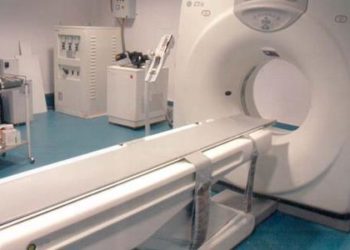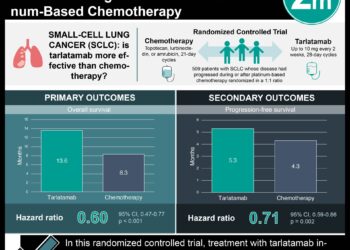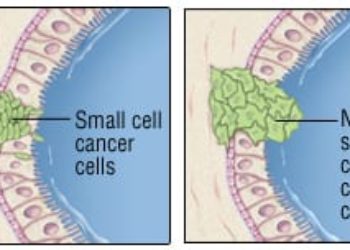Rociletinib may be effective in treatment-resistant lung cancer (non-small cell)
1. In patients with T790M EGFR-mutated treatment-resistant lung cancer who were treated with rociletinib, there was an objective response rate of 59%, compared to only 29% in T790M-negative disease.
2. The most common adverse effect noted in patients treated with rociletinib was hyperglycemia, which was responsive to dose de-escalation and oral hypoglycemic medications.
Evidence Rating Level: 2 (Good)
Study Rundown: A major breakthrough in the treatment of non-small cell lung cancer (NSCLC) was the development of specifically targeted epidermal growth factor receptor (EGFR) inhibitors; however, treatment efforts have been hampered by the emergence of resistance. This is often mediated by a T790M EGFR mutation and occurs commonly with treatment with first-generation EGFR inhibitors.
This drug-company sponsored phase 1-2 study assessed the safety, side-effect profile, and antitumor activity of rociletinib, a small-molecule, orally available mutant-selective inhibitor of EGFR, specifically with the T790M mutation. Patients had EGFR-mutated NSCLC who had previously experienced disease progression while on a first-generation EGFR inhibitor. Patients specifically with the T790M mutation received escalating doses of rociletinib. In this population of 46 patients, the objective response rate was 59% (95% CI, 45 to 73), compared to a rate of 29% (95% CI, 8 to 51) among patients with T790M-negative disease; this dichotomy was seen as a proof-of-concept of the targeted nature of rociletinib. The predominant treatment-related adverse event was hyperglyecmia, which occurred in 22% of patients receiving therapeutic doses of rociletinib; this was managed with dose reduction and oral hypoglycemic agents. Notably, the syndrome of rash, stomatitis, and paronychia commonly associated with inhibition of nonmutant EGFR was absent in this study, underscoring the targeted nature of the treatment.
This study provides encouraging grounding to consider further studies of rociletinib in the treatment of NSCLC associated with the T790M mutation; these studies will be greatly strengthened by larger sample sizes as well as a randomized, controlled study design in order to compare this therapy to existing standard treatments in terms of outcomes as well as side effect profiles.
Click to read the study, published today in NEJM
Click to read an accompanying editorial in NEJM
Relevant Reading: Epidermal growth factor receptor mutations in lung cancer
In-Depth [prospective cohort]: This phase 1-2 study evaluated the safety and antitumor activity of rociletinib in 130 patients with NSCLC who had disease progression during previous treatment with an earlier generation EGFR inhibitor. Patients underwent tumor biopsy during screening to determine EGFR mutation status. Patients had a median age of 60 years and had most often been treated previously with erlotinib (92%), a first-generation EGFR tyrosine kinase inhibitor. 50% of patients had three or more sites of metastatic disease; 44% had a history of brain metastases. The objective response rate among 46 patients with confirmed T790M mutations was 59% (95% CI, 45 to 73), with a disease control rate of 93%. By comparison, among patients who were T790M-negative, the objective response rate was 29% (95%CI, 8 to 51), with a disease control rate of 59%. Adverse events included hyperglycemia (22%) and grade 1 or 2 diarrhea (20%).
Image: PD
©2015 2 Minute Medicine, Inc. All rights reserved. No works may be reproduced without expressed written consent from 2 Minute Medicine, Inc. Inquire about licensing here. No article should be construed as medical advice and is not intended as such by the authors or by 2 Minute Medicine, Inc.









